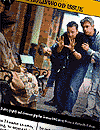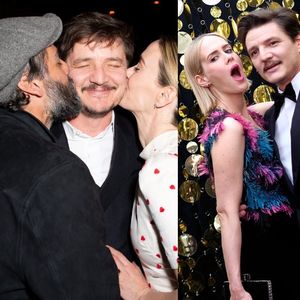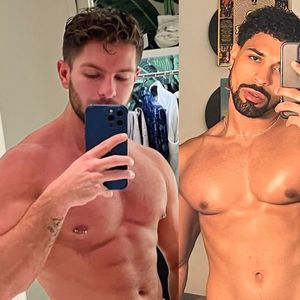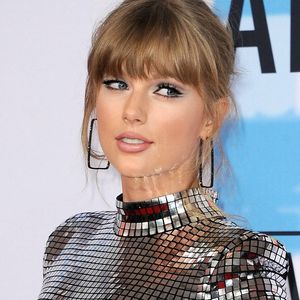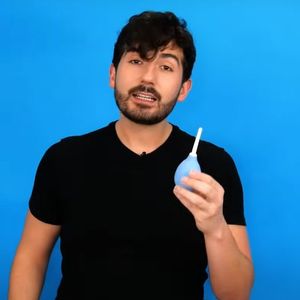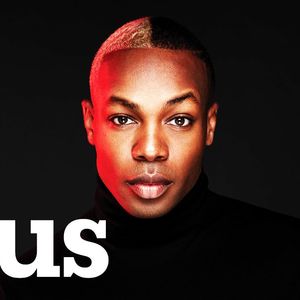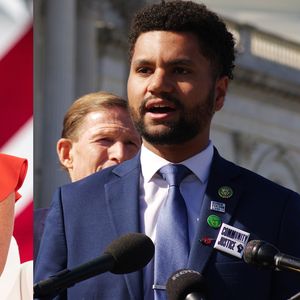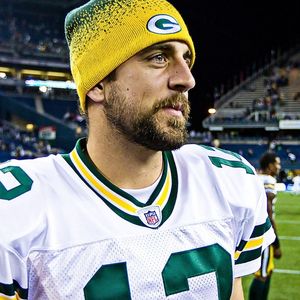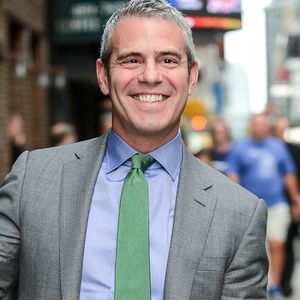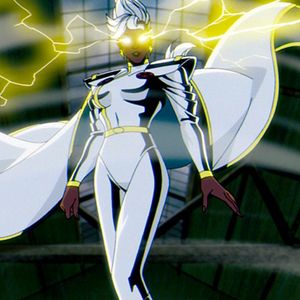"The
Hours is not a gay film," says David Hare,
the acclaimed British playwright who adapted Michael
Cunningham's Pulitzer Prize-winning
novel for the screen. If by "gay film" Hare
means a movie about "the gay experience"
that speaks chiefly to queer audiences, he's
right. Since its release in December, The Hours has
found enthusiastic audiences (and critics) of all
stripes--an adulation confirmed by its nine Academy
Award nominations, including Best Picture, Best
Director, and three acting nods. But for lesbian and
gay observers, what's remarkable about the
golden reception afforded The Hours is that all
of its universal themes--the struggle for human
connection, the difficulty of self-expression, and the
search for meaning--are so inexorably
intertwined with the sexual fluidity of its three main women
characters.
"I think
the sexuality of the movie is very fluid," says
producer Scott Rudin, who thanked his life
partner--publicist John Barlow--when accepting
the film's Golden Globe for Best Drama. "I
would not say it's gay or straight. I think
it's really about people who are dealing with issues
that involve their sexuality, but a lot of it is unresolved
and expressed in other ways. Look, it's a movie
that is fundamentally about people who are thinking of
ending their lives. And that is a big, tough subject to
deal with in a movie."
It's true.
At the conclusion of its three intertwined tales--set
in different time periods--the film climaxes
with two characters committing suicide and a third
abandoning her husband and young son. Yet through that
darkness The Hours reaches a stirring place of
affirmation--a moment of pure hope and love
that's encapsulated in a kiss between two lesbian
lovers.
For Meryl Streep,
who shares that final kiss with The West
Wing's Allison Janney, the characters'
sexuality was secondary to their sex. "Listen, I told
Sherry Lansing [the head of Paramount], I think
it's shocking that it's the first time in
[recent] history that a woman-driven film--where women
are the actual protagonists and not the girlfriend of
somebody--could be considered for Best Picture.
And that's amazing. I think that's amazing to
me."
A woman's
film? A gay film? Embracing its many identities is what
The Hours is all about. It's also about
respecting people's choices as they come to terms
with their own identities, says Nicole Kidman, who
plays novelist Virginia Woolf in the movie's
1920s story line. "It's saying, you know, we
have to be really kind to each other," she
adds, "and people make choices [that they need
to make]."
When Laura
(Julianne Moore), a 1950s Los Angeles housewife, decides she
must escape her doting husband and doe-eyed son,
"that's judged so harshly in this
society," says Kidman. "But there's a
reason for that [decision], and it's her
reason, and it's a very pure reason. And it's
a life choice. I just think we all are ready to jump
on the [judgment] bandwagon too easily. You
don't have the right to decide how someone else
should live their life."
Moore agrees and
goes one step further: Laura's abandonment of her
family, she says, is an affirmation of life. "I think
you feel that she chose to live," Moore says.
"At the end of the day, she chose life over
death."
The examination
of such life choices is the crux of the film's three
plot lines, each set during a single day in a
different decade. Streep's Clarissa is a
contemporary lesbian New Yorker preparing for a party to
celebrate her friend and onetime lover, acclaimed poet and
person with AIDS Richard (Ed Harris)--a task
that causes her to question how she lives her life.
Moore's Laura spends her day under the watchful eye
of her intense little son while trying to bake a
birthday cake for her husband and fend off the desire
to escape her life. And Kidman gives her most
transformative performance yet as Woolf, kept in an isolated
suburb by her husband, Leonard, in the hope that sheer
boredom will keep her suicidal despair at bay.
As the movie
weaves from story to story, all of that inner turmoil is
skillfully orchestrated by director Stephen Daldry--to
a hypnotic score by composer Philip Glass--on
its path to eventual transcendence. "Obviously
it's about three women trying to find change in their
lives and their feelings of entrapment or containment
or suffocation or loss," says Daldry.
"As they try to break out of that, I think all of
these women do reach somewhere else, somewhere
positive. What I like about the film is that
you're always aware of the cost of that
transformation--the cost of those choices. We
all make choices about how our lives should be better
or how our lives need to change, but those changes or those
transformations or that search for some level of redemption
is so often sentimentalized."
In a "gay
film"--that is, a movie that could be shunted
aside by the mainstream--those choices would
revolve around the discovery and acceptance of the
precise sexual identity of the three female leads. Is
Virginia Woolf a lesbian? Is Moore's '50s
housewife unhappy in her marriage because she'd
rather be shacked up with her perfectly put-together
neighbor, played by Toni Collette? And how close to a Kinsey
6 can Streep's lesbian Clarissa be--despite
having Sally (Janney) as her partner--when
Richard was the great love of her life?
Such questions
are integral to novelist Michael Cunningham's vision,
Hare says. "Obviously you know Michael's
work, and you know Michael," he says.
"Anything that is in the film about sexuality tries
to be honest to what the book was about, and indeed
what Virginia Woolf herself was about. She could be
typed as a gay writer or a straight writer. Virginia Woolf
at various times was attracted to men and to women.
And I think Michael felt very strongly that he was a
gay man who felt the most important relationships of
his life and most sexual relationships of his life [at
one point] had actually been with women."
Cunningham
himself says sexual identity was not at the center of
Woolf's emotional struggles.
"It's hard to know about Virginia
Woolf," he says. "She hardly had sex at
all. She had sex with Leonard a couple of times after
they were married, and she couldn't manage it. She
had that big affair with Vita [Sackville-West], but
she and Vita had sex only a couple of times with kind
of the same result. She was a mess."
The fact that the
film version of The Hours so defiantly refuses
to define or limit Woolf or its other characters owes
much to director Daldry's vision. Sexual fluidity, he
says, "just seems so natural to me, so I
don't see it as something that I would have to
consider [unusual]."
Daldry is, after
all, the man whose first film was Billy Elliot, which
still has queer viewers debating whether its
11-year-old ballet dancer protagonist grows up to be
gay. The film toys with that question--Billy kisses a
boy and rejects a girl--but declines to answer
it.
Just as Billy
Elliot cannot be pinned down as a gay
coming-of-age story, The Hours isn't
about lesbians through history. It's about the
desperate need everyone has to control their own
destiny, about being open to all possibilities, even
those that may defy traditional notions of sexual identity.
It's a theme that Daldry himself embodies: An
A-list theater director in the 1990s--his An
Inspector Calls won him a Tony in
1994--Daldry did an interview in Out with his
then partner, set designer Ian MacNeil. The two later split
up, and Daldry married performance artist Lucy Sexton.
Cunningham,
however, dismisses talk about Daldry's personal life
in favor of praising his innate talent. "I
think Stephen's sexuality is actually as
incidental as David Hare's is," says the
author. (Hare is straight.) "Stephen is
fearless, and he's hugely ambitious in all the right
ways. He wants to make the biggest, most
idiosyncratic, beautiful things he possibly can. And
that's all I ask for in an artist of any
kind."
As Moore warmly
puts it, "He's, like, deconstructed
gay."
When asked about
his own sexuality, Daldry seems happy to clear the
air--perhaps because, now that he's married,
mainstream journalists assume he has disavowed his gay
past. "What's so funny is when people say,
'Oh, does that mean you're not gay
anymore?' " he says. "And you go,
'Oh, give me a break. What do you mean?'
We wanted to have kids! We thought we'd get
married and have kids. We're allowed to do anything.
I refuse to be boxed in to the idea that, Oh, no, I
can't have kids 'cause I'm gay. I
can have kids if I'm gay. And I can also get married
and have a fantastic life.
"Yes," he continues, speaking firmly.
"To all questions [having to do] with my
marriage, the answer to everything is yes. Do I have sex
with my wife? Yes. Is it a real marriage? Yes. Am I
gay? Yes.
"I think
about the notion of being gay and the notion of sexuality.
You know, you can look at a room with any group of
people, whatever the group of people is or however
they would define themselves, and it's so hard to
box people in, I find these days. People's sexuality
feels so diverse and so particular and so
extraordinary to me that the labels that we try to put
on people feel more and more redundant. But maybe
that's just from my own subjective
personality."
His frankness
served Daldry well in guiding three major performers to
some of their best work. Streep embraces one of her fullest
contemporary roles; Moore beautifully distinguishes
Laura from her other '50s housewife this awards
season, her Oscar-nominated turn in Todd Haynes's
Far From Heaven; and Kidman relishes the
chance to imbue herself with the spirit of one of the 20th
century's greatest writers.
Losing herself in
the role was essential to Kidman, since she feels it
can be destructive for an actor to be too attached to his or
her real-life self, "to the way you are, who
you are, to your identity in the world. I mean,
that's the reason I became an actor," she
says, laughing, "to escape that. I definitely
don't want to be myself."
Cunningham, for
one, was thrilled to see Kidman's absorption into the
part. "I was excited about all three of them,"
says Cunningham. "But I think I had the most
questions about Nicole. I love Nicole, but could she
play Virginia Woolf? Yeah, she was great in Moulin
Rouge, but can she play a dazzling suicidal
genius?"
Kidman goes even
further: "A lot of times, when you get told,
'Oh, this was a crazy woman, or she was mad, or
she was incredibly willful,' it becomes very,
very black-and-white," she says. "And I think
Virginia was gray. Everything is about her search and
her truth. And I love that she was so truthful about
her demons, about her desires, about the things that
terrified her, and I wanted to depict that and also her love
of life. And Michael [Cunningham] really has summed
this up well when he says, 'This is a woman who
as much as she grappled with and thought about death,
she loved life.' "
Striking that
balance in her performance has made Kidman the Oscar
front-runner for Best Actress, which confirms the impression
of many viewers that the she has blossomed from a
movie star to an actor of great stature by capturing
Woolf's essence. Describing Woolf as a woman of
"fragility mixed with strength," Kidman
credits Daldry's encouragement for her
breakthrough work in the role.
It's a
role that could well have influenced the direction of her
life. "I'd love to write a
novel," she says. "I don't see myself
doing this for the rest of my life." Perhaps
unconsciously echoing The Hours' message about
the importance of life's great choices, she
continues: "I think I'll go and move to Europe
eventually. I'd love to get my degree in philosophy.
So many things I'd love to do: become a really
superb cook and have some sort of great bohemian
existence where I could live with 30 or 40 people coming and
going in a big estate in Tuscany or something."
Like a commune?
"I know it sounds ridiculously hippie," says
Kidman, "but I do kind of love that. I love
being around people and music and kids. I think
we're too isolated. People go and live in their own
little place, and I think it's sort of nice to
be around a lot of people."
For the moment,
though, Kidman is still fielding acting offers,
reportedly including Rudin's The Stepford
Wives remake (with a script by Paul Rudnick), the
Bewitched movie, and a project with openly gay
French director Francois Ozon. And she'd
certainly take a call from Daldry. "I'm
dying to work with him again," she says, not only
because he's good with actors, but
"because he is also just kind."
For Streep, much
of what Daldry did that made The Hours work
took place after the filming wrapped. "Part of the
mastery of this was done after the actors were all
gone," she says. "We all did our best.
We worked our little heinies off. But I think the editing
was just magic. And [Daldry] had a great script.
Structurally, it didn't change [from script to
screen]. But that process of how it will all fit
together was definitely more exclusive, more separated from
the actors."
And the actors,
Streep reminds us, were largely separate from each other,
doing most of their work in separate cities at different
times. "It was a very weird experience to see
it eventually," Streep notes. "It was much
less collaborative than other things I've done. And
that was a little frustrating. But it worked out
great."
For David Hare,
the fragmentation of Cunningham's book was a welcome
challenge. "I was a little bit spooked by the fact
that everybody else seemed to regard this book as
incredibly difficult to adapt," he says,
"and I began to think, What's wrong with me
that I can't see what the problem is? And I
think that it's true that I'm very blithe
about subject matter. I've written plays about
the Chinese Revolution and aid to the Third World. So
literary suicide doesn't seem to me an especially
difficult project. But I can see, now that the film is made,
that it's absolutely incredible that a film on
such a serious subject is in fact in hundreds of
cinemas in America, and that's basically a tribute to
Scott and to Stephen."
Unusually for a
screenwriter, Hare stayed with the film throughout the
production, often being on set to trim or tweak or add new
scenes. He can't imagine doing it any other way
again. "For me, The Hours was the best working
experience I've had as a screenwriter,"
says Hare. "Stephen has an incredible gift for
going to the emotional heart of material in a way that makes
ostensibly difficult subjects completely
accessible."
That emotional
accessibility is perhaps the most crucial achievement in
lifting The Hours out of the realm of "gay
film" and into the company of more universal literary
adaptations. Maybe it's the film's
seriousness that causes producer Rudin to insist that
many of his own lighter, more comic works have a more
tangible gay sensibility.
"Movies
like Sister Act and Clueless and First
Wives Club, to me, are much more 'gay
movies' than The Hours," he says.
Nevertheless, Rudin was savvy enough regarding The
Hours' complicated sexual and emotional
themes to hire the one director he thought could make
the movie resonate with all kinds of viewers. When he
offered Daldry the job, Rudin recalls, "Billy
Elliot hadn't been released. He was still
working on it. But I felt the subject [of The
Hours] would be personal to him and he would be able to
make it smart and political and emotional."
If any aspect of
The Hours can be said to best embody that
emotional intelligence and richness, it is the echoing
woman-to-woman kisses that punctuate the film:
Woolf's hungry, unexpected kiss of her sister;
Laura's thoughtful, caring kiss of her stunning
neighbor; and Clarissa's kiss of her lover, Sally.
As Hare says
after dismissing "gay" and
"straight" as "fantastically
old-fashioned" categorizations, "The three
kisses in the film--obviously they're all
ambiguous. They're not sexual kisses; they're
not unsexual kisses. But [Cunningham] was trying, like
Virginia Woolf, to show the way in which sexuality is
woven into people's lives at some quite profound
level."
Listen closely
when Kidman's Woolf is about to kiss her sister,
Vanessa (Miranda Richardson), and you can hear her
gasping for air as if trying to claim Vanessa's
vitality for her own. "It's this strange act
of cannibalism," Daldry says. "There is
almost this need for Virginia to suck the life out of
her, to suck the life that she wants--the life in all
its varied comforts and confidence--out of her sister.
And the idea that that aggression, or that extreme act
of need, should be expressed through a kiss just seems
perfect to me."
Kidman speaks
passionately about that moment: "She needs her, needs
her so desperately." Kidman confesses that she
decided for herself what she thought Woolf's
sexuality was--but prefers not to state the conclusion
she reached. "However you want to describe the
love, the desire for her sister is mixed in with the
jealousy [of her sister's stable family
life]."
Moore's
Laura also initiates a kiss in part out of envy when she
realizes the one thing her neighbor most wants and
can't have--a child--is the one
thing she herself wishes to be free from.
"It's also about love, and it's
also sexual," says Moore. "I mean, the kisses
are emblematic in a sense: emblematic of contact, of
real, true intimacy--a moment of connection
that's pretty intense. That's the way we all
feel. We don't take kisses lightly. No one
does, really. They're not casual--to kind of
touch somebody that way is a truly intimate, very
personal thing to do, so they're incredibly
meaningful, all the kisses."
Hare agrees.
"The film, like the book in a way, is organized
around those three kisses," he says.
"That gave a wonderful structure to me as a
writer. There were three women getting up, three unexpected
visits; there were three crises, three kisses, and
then three women going to bed--and the three
kisses. When I've discussed [the kisses] with people,
I think they understand that they're not one
particular thing. Each of those three kisses comes out
of profound need."
But it's
no accident that the final kiss--the first one that is
truly reciprocated--is between two women in a
long-term relationship.
Streep says that
she loved working with Janney, who created a full
character just by walking into a room. "I
don't know how she does it," says
Streep, who lamented the fact that their complex
relationship wasn't presented as fully in the
movie as it was in the book. Still, what better proof
could there be of the movie's ability to transcend
labels and embrace the emotional vibrance of
nontraditional sexuality? Of making choices and
connections that fulfill the truths we feel about ourselves?
Our reward for diving into the turmoil of Woolf's
mental anguish, Laura's harrowing decision, and
Richard's brave goodbye to Clarissa is that one
passionate connection between two women.
"Part of
the journey of Meryl Streep's character," says
Daldry, "is to find and to celebrate once again
that the positive things in her life are in fact
staring her in the face and so she should look at
them."
Hare explains it
even more succinctly. "Well, I wanted the third kiss
to be a kiss of love," he says simply,
"and, as it were, to conclude the
picture."
